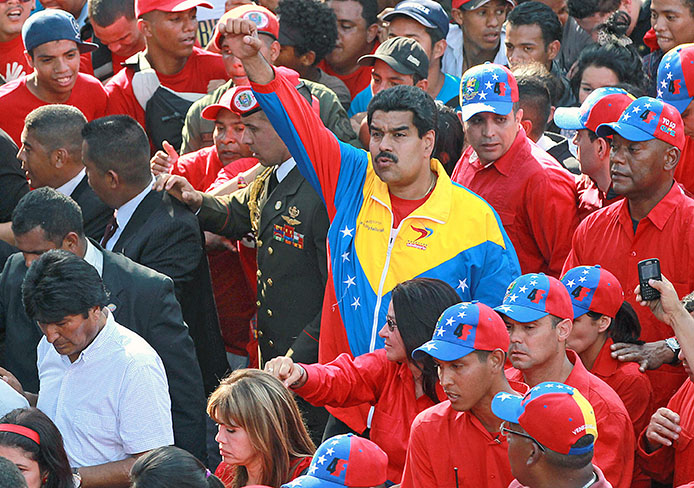
Then-Vice President Nicolas Maduro of Venezuela greets the crowd as thousands of supporters of then-President Hugo Chavez pay respects as his funeral procession travels through Caracas, Venezuela, March 6, 2013.
History will look back at the 2010s as a decade where humanity collectively decided dictatorship was outdated. It started in Tunisia, where an entire people almost spontaneously decided to overthrow President Zine al-Abidine Ben Ali in 2010. The ensuing spiral was quick and successive, with protests hitting Egypt and spreading throughout the Middle East. And just as it seemed as though this democracy movement had all but peaked in Syria, news erupted of protests in both Ukraine and Thailand. The Arab Spring had gone global.
The most recent, and in many ways most interesting, revolts are currently underway in Venezuela, where people, politics and power seem to be as divided as ever. But to say that the Venezuelan revolts are following a similar linearity to that followed by other dictatorship-toppling countries would be a grave mistake. Venezuela’s case is an interesting one, especially when considering how the protests started. In most countries, the poor receive the brunt end of dictatorial oppression, and therefore are an autocrat’s chief concern. However, in Venezuela, it is middle class college students who served as the igniter for countrywide protests. And rather than having a particularly violent incident as their spark, the students gathered in peaceful marches on Feb. 12, the Venezuelan National Youth Day.
The cause of the protests dwindles down to two different, yet surprisingly related, factors: inflation and lack of security. The general violence Venezuelans face on a daily basis is shocking and, according to The New York Times, in 2010 Venezuela officially became more dangerous than Iraq. The numbers are powerful, with more than 24,000 deaths in Venezuela last year. What these numbers mean for Venezuelans is a very cautious and paranoid lifestyle, and a big cause of these protests is that criminals are not the only concern for citizens. According to a student in Venezuela who helped with this article, Venezuelans also live in fear of government-sanctioned, plainclothes police named tupamaros, who terrorize civilians and suppress any voice of dissent. Crime has not been growing in parallel with inflation, but rather as a result of it. As prices skyrocket and inflation soars to more than 50 percent, regular, everyday commodities such as milk and bread are starting to fall into the hands of black markets, and civilians find themselves forced to deal with criminals.
As tensions rose in Venezuela and it seemed clear anti-government voices were going to garner significant attention, two primary figures appeared in opposition to Venezuelan President Nicolas Maduro. One is Henrique Capriles, the man who ran against Maduro for president in the first place, losing to Maduro by a very slim margin. Although there were allegations of counterfeiting and a clear lack of transparency in the elections, Capriles remained oddly pacifistic, maintaining that protests were not the solution to widespread corruption. His fellow opposition leader is Leopoldo Lopez, a former mayor who took a much firmer stance in calling for protests and urging the people to march against the government. Lopez has grown into an almost symbolic icon in Venezuela, becoming a household name after he voluntarily turned himself into the police for accusations of terrorism and murder. And while Lopez’s sacrificial act served to remind the people of the importance of the protests, it also took away a much-needed leading figure.
What makes the Venezuelan protests particularly curious is that observers can usually tell where the country is heading within the first few weeks of protesting. But that is not the case in Venezuela, as Maduro has shown no signs of stepping down, and the students have shown no signs of letting up. The country is divided, and so is the rest of the world. Messages of support for the protestors have flooded in from the U.S. and Europe, while some Latin American countries have voiced their loyalty to Maduro’s government. Even within the country, it’s not entirely clear whether people are demanding reform or upheaval. The path Venezuela will follow is a blurred one, even to the Venezuelans themselves.


